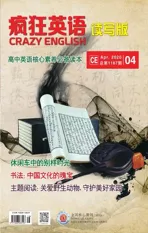Airline edible coffee cups
2020-06-03李全忠
难词探意
1. vanilla /və΄nɪlə/ n. 香草
2. compost /΄kɒmpɒst/ n. 混合肥料;堆肥
3. gluten /΄ɡluːtn/ n. 谷蛋白;面筋
4. soy /sɔɪ/ n. 大豆;酱油
5. sesame /΄sesəmi/ n. 芝麻
Air travel isn't typically an eco-friendly venture. In fact, each flight generally leaves a pretty big carbon footprint; the aviation department of the International Civil Aviation Association (a United Nations agency) estimates emissions of carbon dioxide from airplanes is expected to triple by the year 2050.
Therefore,environmentally conscious carriers are trying to find more immediate ways to reduce waste within the interior of their aircrafts. The next cup of mid-flight coffee is going to look and taste a littledifferent. Air New Zealand is testing out an edible coffee cup on its flights. The sustainable cups arevanillaflavored and leakproof,making them a seemingly ideal and delicious option to serve both coffee and ice cream to passengers. The cups, produced by New Zealand company Twiice, are part of the carriers' ongoing efforts to go green. Although Air New Zealand currently usescompostablecups on all of its flights, the edible cups would take their sustainable efforts even further.
“The cups have been a big hit with the customers who have used these and we've also been using the cups as dessert bowls,” says Niki Chave, Air New Zealand's senior manager of customer experience.Currently, the cups are Twiice's only edible product, but the company says it expects to launch new items soon. According to its website, the coffee cups are made from wheat flour, sugar, egg, and vanilla essence, meaning that those with aglutenallergy will need to steer clear. Twiice also warns that the cups may contain traces of “dairy products, soy, tree nuts, peanuts, and sesame seeds”.
Still, this is a huge step in the right direction, and those worried about allergies can use one of Air New Zealand's plant-based cups which are made from paper and corn instead of plastic. Already by using the plant-based compostable cups across their flights, Air New Zealand estimates they will prevent approximately 15 million cups from ending up in a landfill per year. That's a lot of plastic. Earlier Air New Zealand made a commitment to reduce plastic waste by nixing individual plastic water bottles from Business Premier and Premium Economy cabins. That move alone was expected to keep 460,000 bottles from landfills on a yearly basis and even decrease carbon emissions by more than 300,000 kilograms by reducing weight on the aircraft.
The airline also advocates that customers bring their own reusable bottles on board.
“It's great to see more and more customers are bringing their reusable drink bottles and keep cups on board,” says Anna Palairet, Air New Zealand's acting head of sustainability. “We encourage people to do this—our cabin crew team is happy to fill these bottles.”
Reading
Check
1. What's paragraph 1 mainly about?
A. The popularity of air travel. B. Some eco-friendly ventures.
C. A United Nations agency. D. Carbon footprints from airplanes.
2. What can we know about the edible coffee cup?
A. It is made of paper and flour. B. It is the Twiice's only edible product.
C. It was produced by a British company. D. It can serve coffee to passengers only.
3. The underlined word in paragraph 4 can be replaced by .
A. preventing B. protecting
C. ignoring D. using
Language
Study
Sentence for writing
The airline also advocates that customers bring their own reusable bottles on board. 航空公司还提倡乘客自己携带可重复使用的瓶子登机。
【信息提取】advocate that sb (should) do... 意为“提倡某人做……”。
【句式仿写】她提倡人们去超市购物时携带可重复使用的袋子。
